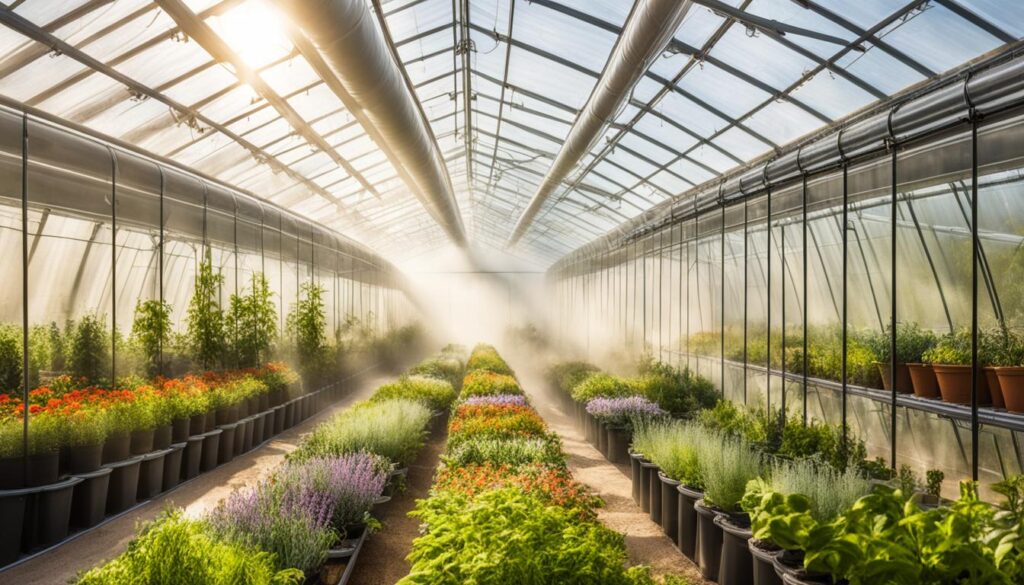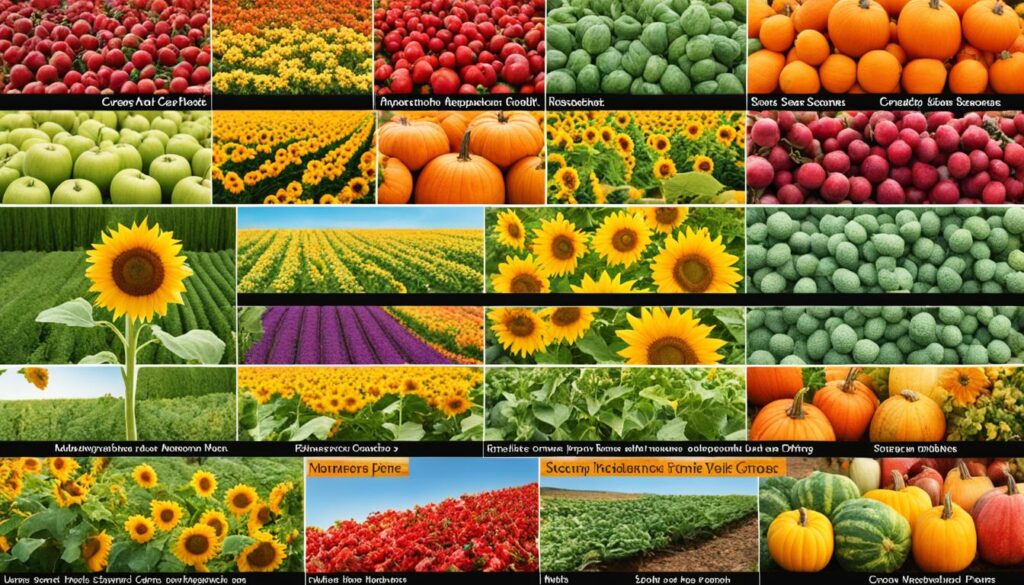Crop planting
Seasonal Crop Guides: Best Plants for Each Season
Unlock the secret to a bountiful, year-round garden with our seasonal crop guides. Discover the best plants for each season. This ensures your garden thrives with organic and sustainable techniques. Whether you’re a pro or just starting, these recommendations will boost your gardening skills.
But here’s the intriguing question: Do you know which plants truly excel in each season, and how to use their strengths for a better garden? Find out as you dive into our expert-curated guides. They’re packed with knowledge and tools to make your garden a lush oasis.
Key Takeaways
- Discover the best plants for each season to ensure a thriving, bountiful garden
- Learn sustainable gardening practices to cultivate your crops organically
- Optimize your garden’s productivity and efficiency with tailored seasonal strategies
- Explore a diverse range of crops, from cool-weather favorites to summer delights
- Unlock the secrets to maximizing your yield and profit through seasonal planning
Growing in Short Seasons: A Northern Gardener’s Guide
Gardening in the north has its own set of challenges, like short growing seasons and unpredictable weather. But, by picking the right plants, you can still have a great garden. Let’s look at some top choices for northern gardens.
Asparagus, Beets, and Broccoli: Cool-Weather Favorites
Short growing seasons mean focusing on cool-weather crops. Asparagus, beets, and broccoli are great for northern gardens. They do well in cooler temperatures and grow fast, letting you enjoy your harvest before the season ends.
Fast-Maturing Varieties for Tomatoes, Squash, and Beans
While cool-weather crops are key, you can also grow warm-weather favorites quickly. Choose tomatoes, squash, and beans that are made for northern gardens. These quick-growing plants give you a jump start and make the most of your short season.
| Crop | Fast-Maturing Variety | Days to Maturity |
|---|---|---|
| Tomatoes | Glacier | 55-60 days |
| Squash | Early Prolific Straightneck | 45-50 days |
| Beans | Provider | 50-55 days |
Adding these cool-weather and fast-growing plants to your garden will help you succeed, even with short seasons.
Spring Planting: Parsnips, Potatoes, and Peas
As snow melts and days get longer, it’s time to plan your spring garden. In northern areas, spring is ideal for growing cool-weather crops. Parsnips, potatoes, and peas are great for early planting, offering tasty and healthy food.
Parsnips have a sweet, earthy taste and grow well in cool weather. Plant them directly in the ground when the soil can be worked, usually in late March or early April. Potatoes are versatile and dependable, planted around mid-April after the frost is gone. Peas love cool, moist conditions and are best planted early in spring.
| Crop | Planting Time | Harvest Time |
|---|---|---|
| Parsnips | Late March – Early April | Summer |
| Potatoes | Mid-April | Summer |
| Peas | Early Spring | Late Spring – Early Summer |
Adding these spring favorites to your garden means a lot of fresh, tasty produce. Enjoy roasting parsnips, mashing potatoes, or eating crisp peas. These crops are a great way to start the new growing season.
“The joy of spring gardening lies in the promise of new growth and the anticipation of a successful harvest.”
Summer Harvests: Hops, Melons, and Berries
The warm summer sun brings life to your northern garden. It’s the perfect time to focus on crops that love the long, warm days. Hops, melons, and berries are great choices. They offer tasty harvests and can make you money.
Hop to It: Brewing Pale Ale for Profit
Hops are key in making craft beer. They have a vibrant green color and strong flavor. By growing hops in your garden, you can make pale ales that people love. This can open doors to the brewing industry and make your summer gardening profitable.
Blueberry Bonanza: Preserves and Seed Saving
Summer isn’t complete without fresh berries. Blueberries are perfect for northern gardens because they love the long days. You can enjoy them fresh, make preserves, or save seeds for next year. This way, you keep the cycle of seed saving going and always have a great harvest.
By growing these summer gardening stars, you’ll get to enjoy many flavors and make money. Whether it’s brewing pale ales or making berry preserves, your garden will be full of summer joy.
Autumn Abundance: Pumpkins, Cranberries, and More
As the seasons change, your northern garden can still give you lots of harvests in autumn. Pumpkins and cranberries are great crops that do well in the cooler fall weather. We’ll look at why these autumn favorites are good to grow, and other profitable options for your fall garden.
Pumpkins are a key part of autumn gardening. They’re not just for carving jack-o’-lanterns; they’re also versatile. You can use them to make delicious pies or other treats. Plus, they grow well in the cooler fall weather.
Cranberries are another great choice for autumn. They’re full of antioxidants and taste great with other fall foods. Think about adding cranberries to your garden, either by growing them or preserving them for later.
- Pumpkins offer a vibrant, versatile harvest for your autumn garden.
- Cranberries are a nutritious, flavorful addition to your fall crop selection.
- Explore other profitable fall crops to round out your autumn abundance.
“Autumn is a second spring when every leaf is a flower.” – Albert Camus
As the leaves turn and the air gets crisper, your northern garden can keep thriving. By focusing on crops like pumpkins and cranberries, you can enjoy the season’s abundance. This brings new chances for making money and having fun.
Planning Your Seasonal Crop Guides
Effective garden planning is key to a great northern growing season. We’ll look at specific goals and strategies for spring and summer. You’ll learn how to plan crops like parsnips, strawberries, and mining in spring. Then, we’ll guide you on setting up for a successful summer with hops, melons, and livestock.
Spring Goals: Parsnips, Strawberries, and Mining
Spring is the time to focus on parsnips, strawberries, and mining. Parsnips love the cool spring weather and can be ready by May. Plant them every few weeks for a steady supply all season.
Strawberries are another spring favorite. Plant them in late April or early May for a summer full of berries. And, mining is best done early spring, before moving on to summer tasks.
Summer Setup: Hops, Melons, and Livestock
- Hops: Start your summer hops in late spring. Use proper trellising and training for a great harvest. This can be used to make refreshing pale ales.
- Melons: Pick fast-growing melon types and plant them in late May or early June. They love the summer heat and can add to your income.
- Livestock: Adding livestock like chickens, goats, or bees to your summer garden can be rewarding. They provide valuable products and help increase your income.
Planning your spring and summer crops carefully leads to a successful and profitable gardening season. Stay tuned for more tips on using your greenhouse and growing diverse crops all year.
Greenhouse Potential: Iridium Sprinklers and Tree Crops
For gardeners in the north, using greenhouses can change the game. With advanced iridium sprinklers and profitable tree crops, you can greatly increase your yields and earnings. This part talks about the great benefits of greenhouses and gives tips to make the most of your space.
Greenhouse gardening lets you control the environment. Iridium sprinklers are precise and efficient, keeping moisture levels perfect for your plants. This means healthier plants and less water waste, making it good for the planet.
Adding tree crops to your greenhouse can also bring in more money. Fruit, nut, and specialty crops like hops can do well in a controlled space. This way, you can reach more customers and make money at different times of the year.
| Crop | Potential Profit | Harvest Timeline |
|---|---|---|
| Apples | $2,000 – $5,000 per acre | Late Summer to Fall |
| Hazelnuts | $3,000 – $6,000 per acre | Late Summer to Fall |
| Hops | $4,000 – $10,000 per acre | Late Summer |
Using greenhouses, iridium sprinklers, and the right tree crops can turn your northern garden into a year-round success. Embrace the greenhouse potential to increase your yields and profits.

“The greenhouse is the key to unlocking the full potential of northern gardening. With the right technologies and crop choices, you can extend your growing season and reap the rewards.”
Seasonal Crop Guides: Maximizing Yield and Profit
Getting the most out of your northern garden means planning your crops with the seasons in mind. By picking the right plants and growing them in the best way, you can boost your yields and profits.
First, know the growing conditions in your area. Seasonal gardening means choosing crops that do well in your region’s temperatures, daylight, and rainfall. This helps your plants grow to their best and produce more.
Next, use smart growing methods to increase your crop yields. Try succession planting, growing plants together, and rotating your crops. Also, using greenhouse gardening can help you grow more by protecting your plants from bad weather.
To make money from your northern garden, plan carefully and grow efficiently. With the right seasonal plans and practices, your garden can be a place of plenty and profit.
“Seasonal crop planning is the foundation of a successful northern garden. By aligning your plant selection and growing methods with the unique rhythms of each season, you can unlock unparalleled yields and profitability.”
Key Strategies for Maximizing Seasonal Crop Yields and Profits
- Understand your regional growing conditions and select the best-suited crops for each season
- Implement efficient cultivation techniques like succession planting, companion planting, and crop rotation
- Invest in season-extending technologies such as greenhouses to prolong your growing season
- Carefully track your expenses and revenue to identify opportunities for cost optimization and increased profitability
With these strategies, you can turn your northern garden into a successful, profitable venture. Enjoy bountiful harvests every season.
Embracing Crop Diversity: The Strengths of Each Season
As a northern gardener, it’s key to grow a variety of crops for a successful garden. Each season has its own special qualities that help your garden grow. By picking a mix of plants, you can have food all year. This guide will show you how to pick a variety of crops and use each season’s best features to make your garden strong and full.
Spring is great for cool crops like parsnips, potatoes, and peas. These plants do well in the cool weather and give you an early harvest. As spring turns into summer, you can grow hops, melons, and berries. These plants love the sun and warmth of summer.
Autumn brings its own chance to grow, with pumpkins, cranberries, and other cool crops doing well in the cool air. By growing these plants, you can keep your garden going into the fall. This way, you get more from your garden and make the most of each season.
Planning your garden with a mix of crops and using each season’s best traits can make your garden amazing. From spring’s cool plants to summer’s warm ones and autumn’s cool ones, each season has its own chance to make your garden great.

| Season | Crop Highlights | Unique Strengths |
|---|---|---|
| Spring | Parsnips, Potatoes, Peas | Hardy cool-weather crops, early harvest |
| Summer | Hops, Melons, Berries | Abundance of sunshine and warmth |
| Autumn | Pumpkins, Cranberries | Thriving in crisp, refreshing air |
“The secret of getting ahead is getting started. The secret of getting started is breaking your complex, overwhelming tasks into small, manageable steps, and then starting on the first one.” – Mark Twain
By choosing a variety of crops and using each season’s best traits, you can make your garden amazing. Start planning your garden today for a year full of growth and rewards.
Conclusion
By using the seasonal gardening guides from this article, you can make the most of your northern garden. These guides are great for both experienced gardeners and beginners. They offer tips to boost your harvest, make more money, and enjoy the many benefits of gardening.
Learn how to use each season’s strengths to grow a vibrant, sustainable garden. The guides in this article will guide you from planting asparagus and beets in spring to growing hops, melons, and berries in summer.
With the right strategies and a focus on sustainability, you can create a successful and profitable garden. Embrace the challenges and chances each season brings. Let your love for gardening lead you to a fruitful and fulfilling future.
FAQ
What are the best plants to grow in each season for northern gardeners?
Northern gardeners can find the best plants for each season in this guide. It lists cool-weather crops like asparagus, beets, and broccoli for spring. For summer, it suggests fast-growing tomatoes, squash, and beans.
It also talks about growing parsnips, potatoes, and peas in spring. Summer is great for hops, melons, and berries. In autumn, pumpkins and cranberries are top choices.
How can northern gardeners make the most of their short growing season?
Planning and choosing the right crops are key for northern gardeners. The guide recommends specific plants for spring, summer, and autumn. These include parsnips, potatoes, peas, hops, melons, and berries.
By using each season’s strengths, gardeners can boost their yields and profits.
What are the benefits of incorporating a greenhouse into a northern garden?
Greenhouses change the game for northern gardeners. They use tech like iridium sprinklers and grow profitable tree crops. This can greatly increase yields and income, even with a short growing season.
How can northern gardeners create a comprehensive seasonal crop plan?
The article offers a plan for a seasonal crop strategy. It advises setting goals and using efficient growing methods for each season. Spring is for parsnips, strawberries, and mining, while summer is for hops, melons, and livestock.
By planning well, northern gardeners can improve their yields and profits.
What are the benefits of embracing crop diversity in a northern garden?
Diversifying crops is crucial in northern gardens. Each season has its own benefits. By choosing a variety of plants, gardeners can have a harvest all year.
This approach makes for a thriving, sustainable, and resilient garden.
Source Links
- https://www.theseasonalhomestead.com/vegetables-for-a-short-growing-season/ – Vegetables for a Short Growing Season
- http://forums.stardewvalley.net/threads/what-is-the-best-crop-in-each-season-to-make-the-most-amount-of-money.7188/ – What is the best crop in each season to make the most amount of money?
- https://gamefaqs.gamespot.com/wii/960313-harvest-moon-animal-parade/answers/187749-what-are-the-best-crops-to-plant-in-all-seasons – What are the best crops to plant in all seasons? – Harvest Moon: Animal Parade Q&A for Wii
- 10 Must-Have Blooms for Your 2025 Garden
- The Health Advantages of Gardening You Need to Know
- How to Create a Small Vegetable Garden Layout Plan: A Beginner’s Guide
- DIY Garden Projects for Small Spaces: Upcycling Ideas to Maximize Your Garden
- Watering Techniques for Small Gardens: Ensuring Your Plants Thrive
- Small Border Plants for Landscaping: Adding Beauty and Functionality to Your Garden
- Year-Round Small Space Gardening: Seasonal Planting Tips for Maximum Harvest
- Essential Tools for Small-Space Gardening: What You Really Need
- The Ultimate Guide to Container Vegetables: What to Grow in Small Spaces
- Budget-Friendly Gardening: How to Create a Thriving Garden on a Tight Budget
- How to Optimize Sunlight in Small Gardens: Tips for Better Plant Growth
- DIY Vertical Planters: Creative Ideas for Small Space Gardening
- Companion Planting for Small Vegetable Gardens: Boost Growth and Deter Pests
- Container Gardening Essentials: Choosing the Right Pots, Soil, and Plants
- Vertical Gardening Techniques: Maximizing Your Small Space with Climbers and Vines
- How to Build a Raised Bed Garden in a Small Backyard: Step-by-Step Guide
- The Best Vegetables for Small-Space Gardens: High-Yield Varieties You Need to Grow
- Smart Vegetable Garden Layouts for Small Spaces: Maximizing Your Green Thumb in Compact Areas
- 40. Best Practices for Managing a Sustainable Garden Year-Round
- Building a Wildlife Pond for Biodiversity
- Advanced Techniques in Sustainable Gardening
- How to Create a No-Till Garden
- The Mental Health Benefits of Gardening
- Using Technology to Enhance Sustainable Gardening
- Getting Certified Organic: Steps and Benefits
